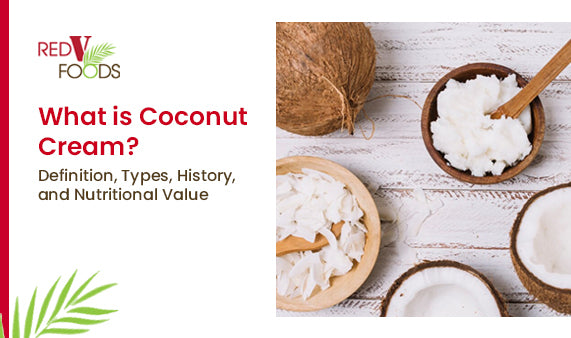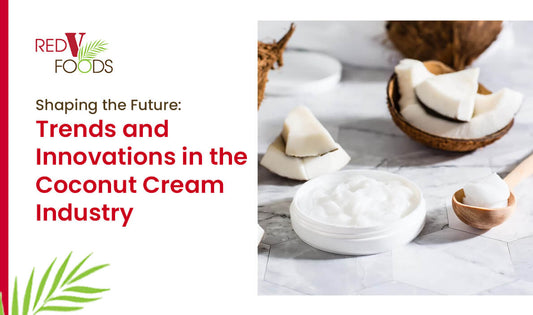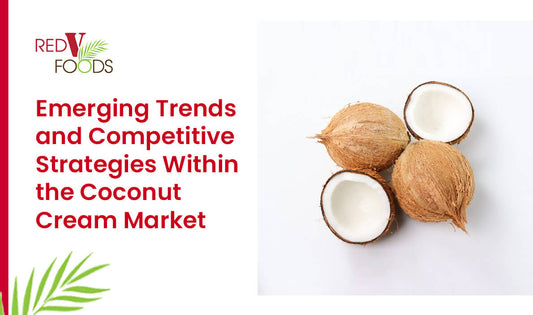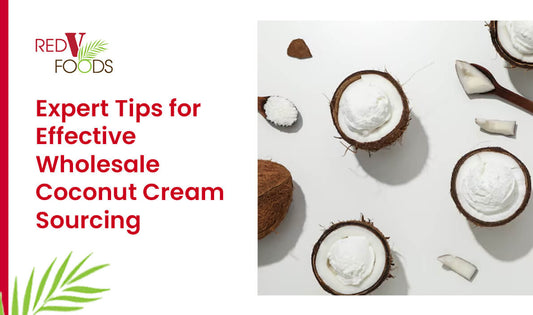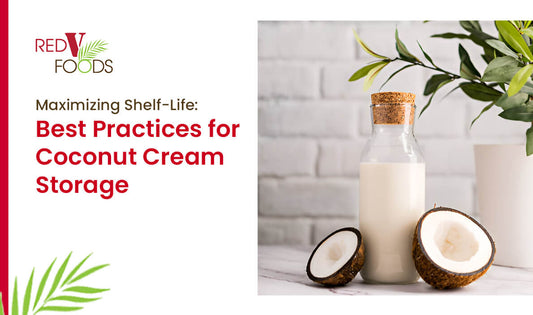- Coconut Cream is a rich, versatile product extracted from fresh coconut meat, used in both culinary and non-culinary applications, from savory dishes to beauty products.
- Compared to coconut milk and coconut water, coconut cream is thicker, richer, and prepared with less water.
- Coconut cream is rich in healthy fats, vitamins, and antioxidants, offering potential cardiovascular, digestive, and glycemic benefits.
- Red V Foods produces high-quality coconut cream using sustainable sourcing methods, making it a leading supplier in the United States.
Coconut cream is more than just an ingredient — it's a natural treasure and a symbol of culinary creativity. Once considered exotic, it has now become a popular choice in healthy and gourmet dishes, thanks to its appeal as a great alternative for vegan and health-conscious diets.
In this article, we’ll cover everything you need to know about coconut cream, including its types, uses, health benefits, and more.
What is Coconut Cream?
Coconut cream is a rich, flavorful product made by extracting the thick, concentrated portion of coconut milk. It's produced by grating or blending fresh coconut meat, then separating the cream from the liquid.
Highly versatile, coconut cream is commonly used in a variety of dishes, from savory curries to decadent desserts. Beyond the kitchen, it also finds its way into cosmetics and hair care products, valued for its nourishing properties.
Different Types of Coconut Cream
There are various types of coconut cream available to suit a wide range of culinary needs, each adding richness and flavor to everything from savory dishes to desserts and beverages. The different types of coconut cream are:
- Unsweetened Coconut Cream: The most basic and versatile type, perfect for both sweet and savory dishes without any added sugars.
- Heavy Coconut Cream: A thicker, richer, and more concentrated version of standard coconut cream, ideal for recipes that call for extra creaminess.
- Organic Coconut Cream: Made from certified organic coconuts, this variant is free from synthetic pesticides, fertilizers, and harmful chemicals, making it a healthier choice for conscious consumers.
Related Article: Looking for a Holy Grail Ingredient? Try Unsweetened Coconut Products!
How Coconut Cream is Prepared
Homemade and processed coconut cream follow the same basic steps — cracking, grating, extracting, and separating the coconut meat — but differ in execution. Here’s a quick comparison of their preparation methods:
Homemade Coconut Cream
Making homemade coconut cream is a straightforward process that involves grating or blending fresh coconut meat and then straining the liquid to separate the cream from the solids. The resulting cream can be further thickened by simmering it on the stove to evaporate some of the water content.
Commercially Processed Coconut Cream
Commercially processed coconut creams are typically made by extracting the cream from mature coconuts using mechanical or chemical methods. The processing techniques can vary, but the goal is to produce a consistent, shelf-stable coconut cream that can be easily incorporated into a wide range of recipes.
These commercially processed coconut creams are typically treated with food additives, such as emulsifiers and stabilizers, to stabilize and preserve them. Subsequently, the product is pasteurized and packaged in cans that have also undergone heat sterilization.
Related Article: Partner With Only the Best Contract Manufacturer for Your Coconut Products
Coconut Cream vs Other Coconut-Based Liquids: What are the Differences?
Coconut cream is often compared to other coconut-based liquids, such as coconut milk and coconut water. While they share some similarities, there are distinct differences in terms of taste, texture, and preparation.
The table below summarizes some key distinctions among the three:
|
Product |
Taste |
Texture |
Preparation |
|
Coconut Cream |
Rich, creamy, and dense |
Thick and velvety |
Extracted from grated coconut meat and strained |
|
Coconut Milk |
Mild, slightly sweet |
Thinner and more watery |
Extracted from grated coconut meat and strained, but contains more water; can also be made by diluting coconut cream with water |
|
Coconut Water |
Refreshing, slightly sweet |
Thin and watery |
Extracted directly from the coconut, without any processing |
Understanding these differences can help you choose the right coconut product for your specific culinary needs, whether it’s for a creamy curry, a decadent dessert, or a refreshing beverage.
Coconut Cream Across Countries: Tradition, Healing Properties, and Cultural Heritage
Tropical and subtropical countries have long appreciated the versatility of coconut, and have been dependent on it for different aspects of their lives, from shelter to sustenance and healing.
Coconut as a Valued Resource Throughout History
For a long time, the coconut has been recognized as a valuable resource and is commonly known as the “tree of life” because of its versatility and the various products that can be made from it.
Coconuts are said to have originated in India and Southeast Asia, spreading globally via natural means and human trade, notably by Arab traders who brought it to Africa via the seas, and to Europe via the Silk Road.
Nowadays, coconuts have become a multibillion-dollar industry, with products like coconut cream gaining popularity as dairy alternatives, especially in the West. In fact, the coconut products market is valued at $6.7 billion in 2022 and is projected to reach $13.6 billion by 2030, growing at a 9.25% CAGR.
Coconut Cream in Traditional Cuisines
Coconut cream has been a staple ingredient in traditional cuisines, most notably in South India, Southeast Asia, and East Africa, as well as in North Africa and Middle East.
In these regions, coconut cream is widely used in a variety of dishes. Some examples include the Gang Gai Khao Mun (Thai Chicken Curry) and Chicken and Shrimp Laksa from Southeast Asia, and Tembleque de Coco (Coconut Pudding) from the Caribbean.
Coconut Cream in Traditional and Complementary Medicine
In Ayurveda, coconut cream is believed to have various therapeutic benefits, including anti-inflammatory, antimicrobial, and digestive properties. This traditional knowledge has piqued the interest of modern researchers, who are exploring the scientific basis for the potential health benefits of coconut cream.
Related Article: Top 5 Reasons To Use Coconut Products in Your Food Business
Health Benefits of Coconut Cream: A Dairy-Free Alternative You Need
Coconut cream serves as a versatile cooking ingredient and delivers excellent nutritional benefits. It's rich in healthy fats, particularly medium-chain triglycerides (MCTs), which offer various health advantages. It also packs valuable vitamins, minerals, and antioxidants.
Here’s a quick breakdown of coconut cream’s health benefits:
Antioxidant Properties
Coconut milk was found to contain antioxidants called phenolic compounds that can shield cells from oxidative stress and damage. This can also be said for coconut cream, which is essentially just a thicker version of this coconut product.
Cardiovascular Health
It’s important to note that while coconut products are high in saturated fat, their unique fatty acid composition, including lauric acid, distinguishes them from other foods high in saturated fats. The medium-chain fatty acids in coconuts are absorbed differently and may offer health benefits such as improved lipid profiles.
Low Glycemic Index
With a glycemic index range of 35-54, coconut is considered a low-GI food, potentially reducing the risk of chronic diseases like type II diabetes. This is also the principle behind considering coconut sugar as a healthier alternative sweetener to regular sugar, which has a comparably higher GI.
Dietary Considerations
While coconut cream is a nutritious ingredient, it’s important to be mindful of dietary restrictions and intolerances. Some individuals may have allergies or sensitivities to coconut products, and those following certain dietary patterns, such as low-fat or low-calorie diets, may need to consume coconut cream in moderation.
Coconut cream has also gained popularity as a dairy-free alternative, making it a valuable ingredient for vegan and ketogenic diets. Its rich, creamy texture and versatility make it a go-to choice for those seeking to replace dairy-based products in their recipes.
Premium Coconut Products by Red V Foods
Coconut cream holds a prominent place in both culinary traditions and modern kitchens. Beyond its culinary appeal, coconut cream offers nutritional benefits, including healthy fats, vitamins, and minerals, making it a valuable addition to a healthier diet.
At Red V Foods, we’re committed to sourcing only the best coconuts through ethical and sustainable means to produce high-quality coconut cream. As the leading supplier and manufacturer of coconut cream in the United States, we offer a wide range of coconut products, including coconut cream, to cater to your specific culinary needs.
Reach out to us today to learn more or receive a price quote on our coconut product offerings.
Frequently Asked Questions (FAQs)
Is coconut cream suitable for a vegan diet?
Yes, coconut cream is indeed suitable for a vegan diet. It is derived entirely from plant sources, specifically the flesh of mature coconuts, and contains no animal products.
Is coconut cream a suitable alternative to dairy cream in recipes?
Coconut cream can be used as a substitute for dairy cream in many recipes. Its rich, creamy texture makes it an excellent alternative, and its distinct taste can also add a unique flavor profile.
How should coconut cream be stored, and what is its shelf life?
Commercially processed coconut cream can last for up to 6 months, or depending on the manufacturer’s expiration date. To store coconut cream properly, transfer it to an airtight container and keep it in the refrigerator after opening. It’s best to use opened coconut cream within 5 to 7 days to ensure freshness and prevent spoilage.
What are the signs of coconut cream going bad?
To determine if coconut cream has gone bad, you can look for several signs that indicate spoilage. Some strong indications of a spoiled coconut cream include the presence of a sour, rancid, or otherwise unpleasant smell, sour or off flavor, and excessive separation or a chunky texture.
Is coconut cream the same as cream of coconut?
No. Coconut cream is unsweetened and versatile for various culinary applications, whereas the cream of coconut is sweetened and best suited for desserts and drinks.
References
- Asghar MT, Yusof YA, Mokhtar MN, Ya'acob ME, Mohd Ghazali H, Chang LS, Manaf YN. Coconut (Cocos nucifera L.) sap as a potential source of sugar: Antioxidant and nutritional properties. Food Sci Nutr. 2019 Sep 30;8(4):1777-1787. doi: 10.1002/fsn3.1191. PMID: 32328243; PMCID: PMC7174220.
- Coconut cream. (n.d.). https://www.joyfulbelly.com/Ayurveda/ingredient/Coconut-Cream/477
- Coconut Products Market - Share, size and Industry analysis. (n.d.). https://www.coherentmarketinsights.com/market-insight/coconut-products-market-2562
- Ganeshram, R. (2022, August 16). Cracking Coconut’s History. https://www.aramcoworld.com/Articles/January-2017/Cracking-Coconut-s-History
- Hewlings S. Coconuts and Health: Different Chain Lengths of Saturated Fats Require Different Consideration. J Cardiovasc Dev Dis. 2020 Dec 17;7(4):59. doi: 10.3390/jcdd7040059. PMID: 33348586; PMCID: PMC7766932.
- Jiggly coconut pudding. (2022, December 26). The Spruce Eats. https://www.thespruceeats.com/tembleque-coconut-pudding-2137911
- Karunasiri AN, Gunawardane M, Senanayake CM, Jayathilaka N, Seneviratne KN. Antioxidant and Nutritional Properties of Domestic and Commercial Coconut Milk Preparations. Int J Food Sci. 2020 Aug 1;2020:3489605. doi: 10.1155/2020/3489605. PMID: 32832538; PMCID: PMC7422486.
- Lo, B. (2023, July 20). Chicken and shrimp laksa. Food & Wine. https://www.foodandwine.com/recipes/chicken-shrimp-laksa
- Marks, J. (2024, July 12). Coconut cream: What to know about this Dairy-Free Alternative. Verywell Health. https://www.verywellhealth.com/coconut-cream-8663518
- Rd, J. C. M. (2023, May 4). The Coconut Allergy Diet Guide. Verywell Health. https://www.verywellhealth.com/the-coconut-allergy-diet-guide-1324149
- Suntaranon, N. (2023, August 2). Gang Gai Khao Mun (Thai Chicken Curry). Food & Wine. https://www.foodandwine.com/recipes/gang-gai-khao-mun-thai-chicken-curry

